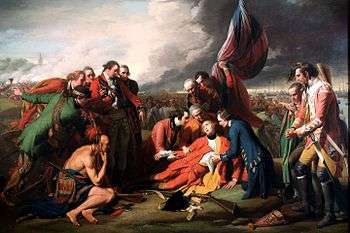1755 in Canada
| Years in Canada: | 1752 1753 1754 1755 1756 1757 1758 |
| Centuries: | 17th century · 18th century · 19th century |
| Decades: | 1720s 1730s 1740s 1750s 1760s 1770s 1780s |
| Years: | 1752 1753 1754 1755 1756 1757 1758 |
| Part of a series on the |
| History of Canada |
|---|
| Timeline |
| Historically significant |
| Topics |
| By Provinces and Territories |
| See also |
|
Events from the year 1755 in Canada.
Incumbents
Governors
- Governor General of New France: Michel-Ange Duquesne de Menneville
- Colonial Governor of Louisiana: Louis Billouart
- Governor of Nova Scotia: Peregrine Hopson
- Commodore-Governor of Newfoundland: Hugh Bonfoy
Events
- 1755-75 - William Johnson, British superintendent of Indian affairs in the northern colonies, persuades the Iroquois League to break its neutrality and side with England against France.
- Monday June 16 - Fort Beausejour, garrisoned by 400 Frenchmen, is surrendered to Col. Winslow, of Massachusetts, commanding 2,300, of whom 300 are regulars.
- July: Seven British Colonial Governors form a Treaty with the Iroquois, and project a federal union for carrying on war, under a president to be named by the King.
- Tuesday July 15 - Announcement, in England, of the capture of French troops on their way to Canada.
- Monday September 8 - Baron Dieskay, with 1,500 French and Indian troops, overcomes Col. Williams, with 1,400 English and Indians, near Fort George. Immediately afterwards, the French attack Col. Johnson's force, barricaded at Fort George, but are repelled, with heavy loss. The two commanders are wounded, and the two opposing Indian chiefs are killed. Baron Dieskay is captured by the English, who dress his wounds and earn his lifelong gratitude by their kindness.
- For his success at Fort George, Col. Johnson is made a baronet, with a grant of 5,000 pounds.
- The Great Expulsion begins. English Expulsion of the French Acadians—who lived and intermarried with Nova Scotia and Cape Breton Mi'kmaqs (many of whom were also taken). Forcibly loaded into ships and deposited randomly along the southern (now American) coasts, many (probably 1/3 to 1/2) died. Some are ancestors of the Cajuns of Louisiana, and a few made their ways back home. Acadians were idealists, hostile to King and Church authority, who lived in peace with the Mi'kmaqs. Neither the French rulers nor the English wanted them.
Deaths
- September 13 - Pierre Gaultier de La Vérendrye, explorer (born 1714)
gollark: I'm perfectly fine with hardware keyboards.
gollark: Encryption is very reliant on having deterministic processing and exactly correct data input, brains... do not do those.
gollark: I don't think that would work very well.
gollark: Maybe. It *would* be useful to run random number generators in my head, and such.
gollark: Unfortunately, I can't do bitops fast enough.
References
This article is issued from Wikipedia. The text is licensed under Creative Commons - Attribution - Sharealike. Additional terms may apply for the media files.
